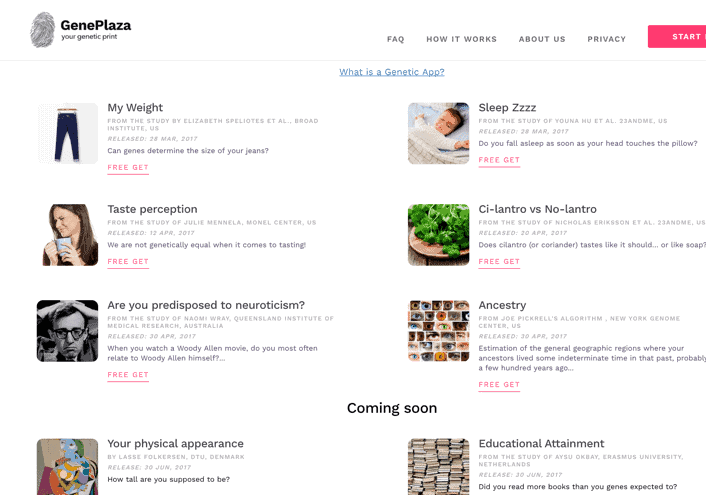
GenePlaza is an app development platform designed for scientists to create and sell genetic mobile applications. Their growing collection of Genetic Applications provides end-users with valuable insights on various aspects including cognitive abilities, health traits, and potential for addictions. In this interview, GenePlaza co-founder and CEO Alain Coletta explains what the platform is all about, and invites researchers and scientists to give GenePlaza a try.
Please describe the story behind the company: What sparked the idea, and how has it evolved so far?
Gene plaza was founded on the idea of a physical business model for keeping personal genomics data fully private. Our main mission is to analyze and manage genomic data for other companies. We are involved in a series of platforms that offer this kind of service, similar to DNANexus, Seven Bridges Genomics, and LifeBit; Platforms that manage genomic data and the pipelines used to process it.
It was very natural for us to offer a subset of those services for individual consumers, but the idea was to know whether we could offer these services while keeping the data fully private. By fully private I mean that we do not monetize data, we will not look at the data, we won’t sell the data, and we won’t share the data with anyone. When you put your data on GenePlaza, you can be sure that it’s private. This is why we don’t offer any relatives data, for example, because we don’t want you to be found by accident, against your will. There are already plenty of websites that do that very well, so if you want to put your DNA data out there in the wild and get found, there are other places you can do that.
Given the number of polygenic risk papers being published these days, we thought there was a chance to re-implement those polygenic models and offer the results to the users. We started doing a few ourselves, and then we opened it to other developers, researchers, and scientists who wanted to deploy their models on GenePlaza. Basically, you push your own apps into GenePlaza and you make them available to the community.
When you deploy your app on GenePlaza, everything runs in the platform and nothing gets out. So as a developer, you don’t get to see the data. It doesn’t get pushed back to you for analysis. Instead, you push a sandbox container into the platform for the algorithm to run and from that, the algorithm creates the results for the users.
We built that and we’re really happy to see that more and more companies are interested in this model and the results. We’ve been growing organically for about three years, and we have hundreds of thousands of users using the platform every day.
What kind of things can I discover if I take a DNA test and run it through your apps?
The way it works is that you upload your DNA data, or you buy our DNA test kits, and once you get your results you can upload your data from 23andMe or any of the larger companies out there. Once you have your data in, you can browse the different reports that are available in the apps and choose whatever you want.
For example, the Health Traits application is based on the results from a UK Biobank study, which surveyed around 500,000 people in the UK with hundreds of questions. For each question, the application computes a predisposition score. The results are calculated with data from Neale lab that generated summary statistics for that study.
Similarly, the Addictions app will compare your DNA data with general published statistics to reveal your probability to become addicted to coffee, alcohol, cigarettes, and drugs.
We focus only on polygenic traits and ancestry applications. So we don’t just look at one variant. All of the papers that have been published out there come from genome-wide association studies. There’s a huge catalog where people just implement the models and make them available for users.
Marketing wise, we don’t pretend to sell predictions or diagnostics, we are simply selling the models that come from the research. We try to emphasize this point, that GenePlaza is just a model that tells you what your score would have been if you had played a part in the study. Some applications show various graphs computed from models issued by independent studies, but none of them tell you that you are this or that, because it’s not about prediction. We try to make it clear and to stress it as best we can to our users.
It’s not a tool to learn something specific about you, it’s more about getting to know the intrinsic part of your DNA. It’s a complicated thing that has external stimuli and all sorts of other things that have to be taken into account.
Here’s a view of some of the apps you can find on GenePlaza:

You mentioned that part of your model revolves around keeping the data private. Why is that so important?
Security is a challenge that every company that uses client data these days needs to address. It’s something that we are not particularly fond of, but there is valuable data in these apps and models, so why not allow users to keep their data private?
That’s our philosophy and I think we’re probably the only ones doing this. Everyone else seems to be betting on the value of the data itself. We’re doing things a bit differently.
Which trends or technologies do you find to be particularly intriguing these days around your line of work?
We’re doing a lot of machine learning and artificial intelligence algorithms to try to predict what the results would be for a given model. These are applications that are very interesting for research purposes. However, they’re very difficult to deploy. It’s pretty complicated to implement and to test these new approaches, and it’s also very expensive because they consume a lot of power and if you get it wrong, you pay a fair amount of money to split testing. So, once you get the know-how and the expertise to get these things out in an efficient way, you can save the company a lot of money. So, as part of our business model, we offer consulting services for analyzing data.
How do you envision the future of DNA research?
I don’t like to predict the future but I think there’s going to be a lot of regulation coming in, which is already the case in Europe.
We’re just at the beginning so there are very few people that have access to their DNA right now. In research and clinics, it’s moving fairly quickly, but I think it’s going to take a while before DNA is in the past board.
There’s also a lot of interesting applications, it’s not just DNA for metagenomics and epigenomics. I think DNA is just a tiny part of it and it’s the integration of all of these technologies together that will reveal the most interesting results and applications. How long is it gonna take before we successfully integrate these things for users on a daily basis is a question that remains unanswered.

